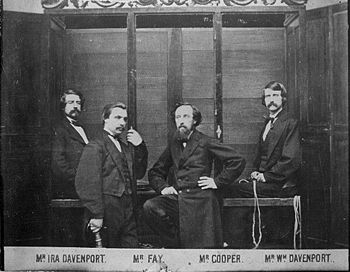
However, for their latest show, The Infamous Brothers Davenport goes some way towards shutting my stupid mouth. Enlisting Peter Arnott on script duties, they are teaming up with a playwright known for his engaged, intelligent and political writing (he was part of Wildcat's legendary line up, when satire still hoped to make theatre impact on society). And while past Vox Motus works have been been undermined by poor scripting -Bright Black was the victim of a faux-classical poetry - the Arnott alliance hints at a new potential.
While they were in rehearsal for Bros Davenport, I bothered the company - and they generously supplied answers to my questions.
Vox Motus has a reputation amazing use of theatre's architecture, diverse techniques and playing with theatrical tropes, but how did you get involved with Peter Arnott?
We had begun a partner project with Playwrights Studio Scotland to bring new playwriting voices into our process. Peter was the perfect collaborator for this project as he's a theatrical wordsmith with a real ability to conjour the period through his text and dialogue." He's also a real team player and that is key for any level of involvement in a Vox Motus production. We're a very collaborative bunch. I think Peter's really helped us to tell a dark, compelling tale of two brothers in conflict woven around acts of illusion and Vox Motus theatricality.
Where did your interest in the "magic" of the 19th century come from?
Jamie has worked as a magician since he was a teenager. It's a job that taken him all over the world. Nowadays his focus is on illusion for theatre (e.g. creating the flying flame Tinkerbell for NTS's Peter Pan). So we're often reading about magic and illusionists. The 19th century really was the golden era for magic - and indeed the manifestation of spirits and spiritualism.
Is this a period piece, or does it have an immediate contemporary resonance?
Surely every period piece should have an immediate contemporary resonance - otherwise why are we telling this modern audience this story? We are interested in a gripping, human story rather than a history lesson. The 1860's is framing for this piece - a time and space in which we understand spiritualism was finding its voice and magic was celebrated across the western world. Regardless, communication with spirits is still very much a part of many people's lives today. It's a means of offering hope and that is a universal need and quest.
Vox is known for adding to its repertoire of theatrical techniques with each production - as well using some great music.
We are definitely using some great music! We have commissioned musician and composer Phamie Gow, who is performing her original soundtrack live alongside the production. It's not every day you work with a musician who has performed at Carnegie Hall, NYC, at the request of Philip Glass. She has just spent a period in the States (where the Davenport Brothers came from) and there is a beautiful American sensibility to her composition.
Is there anything new that you have added for this production? Or anything familiar from past shows?
I think another exciting prospect is that a small number of audience members will be able to opt in to taking part in the Brothers' seance. It's going to be a very immediate experience for the audience - and the actors who are taking them on this journey.
